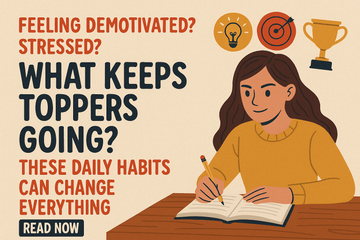Success in exams doesn’t come from last-minute cramming or endless hours spent staring at books.
It comes from the power of daily discipline, smart planning, and habits that fuel both your mind and motivation.
Whether you’re aiming for school board exams, NEET, JEE, CAT, UPSC, or CLAT, the truth remains the same –how your prepare each day matters more than how long you prepare. The most successful students don’t just work hard; they build routines that support their goals, day in and day out.
In this blog, we’ll explore the real formula for exam success –not tips you’ll forget tomorrow, but daily habits you can stick to. These habits will keep you focused, energized, and genuinely motivated throughout your preparation journey.
Let’s reshape your exam game –one smart habit at a time.
Why Do Daily Habits Matter for Exam Prep?
Before diving into the habits, let’s understand why they matter:
· They build a routine, reducing stress and decision fatigue.
· Habits create momentum –the more consistent you are, the easier studying feels.
· They help you manage time efficiently, leaving space for rest and recovery.
· Most importantly, they keep your motivation sustained, rather than relying on fleeting bursts of inspiration.
Let’s break down the habits that form the foundation of every successful student’s routine.
1. Start Your Day with a Morning Ritual
How you start your day sets the tone for everything that follows.
What to include:
- Wake up early – between 5 AM and 7 AM is ideal.
- Hydrate immediately – drink a glass of water to rehydrate your brain.
- Engage in light physical activity – yoga, stretching, or a 10-minute walk.
- Do a 5-minute review of your goals or to-do list for the day.
- Practice gratitude or positive affirmations – this keeps stress in check.
Why it works: A structured morning creates mental clarity and boosts productivity throughout the day.
2. Follow a Smart Study Schedule (With Breaks!)
Top performers don’t just study more—they study smarter.
Use time-tested techniques like:
- Pomodoro Technique – 25 minutes study, 5 minutes break.
- 52-17 Rule – 52 minutes focused study, 17 minutes rest.
- Time-blocking – Allocate fixed blocks of time for subjects or topics.
Create a weekly plan that:
- Divides subjects based on priority and difficulty.
- Balances revision and new learning.
- Includes buffer time for missed or difficult topics.
Why it works: It eliminates procrastination and helps you track progress in real-time.
3. Keep a Visual Study Tracker
Create a wall calendar, whiteboard, or digital sheet where you log your daily study hours or chapters completed.
Bonus tip: Use color codes for different subjects, or emojis for how your day felt.
Why it works: It gives you a visual dopamine boost—seeing your progress builds motivation and satisfaction.
4. Stay Curious, Not Just Committed
When students force themselves to study, motivation can dwindle. But if you stay curious about what you're learning, it becomes less of a chore.
How to stay curious:
- Watch short educational videos related to your topic.
- Read case studies or real-world applications of concepts.
- Discuss topics with peers or mentors.
- Ask yourself: “Why does this matter?” or “Where is this used in real life?”
Why it works: Curiosity is an intrinsic motivator—it drives you to learn without external pressure.
5. Limit Distractions (Especially Digital Ones)
In a world full of notifications, you need to protect your attention span.
Tactics to reduce distractions:
- Use Focus Mode or apps like Forest, Cold Turkey, or Freedom.
- Keep your phone in another room while studying.
- Set specific times to check social media.
- Unsubscribe from unnecessary YouTube channels or newsletters.
Why it works: A focused hour of study is worth more than 3 distracted ones.
6. Eat Brain-Boosting Foods
Your brain needs fuel to function at its best. Eating junk food or skipping meals can lead to fatigue and impaired cognitive function, including foggy thinking.
Include in your diet:
- Oats, nuts, bananas, and eggs for energy.
- Dark chocolate, berries, and green tea for concentration.
- Leafy greens, lentils, and milk for overall cognitive health.
Stay hydrated! Even mild dehydration affects memory and alertness.
Why it works: Healthy food enhances alertness, memory, and mood—all essential for study success.
7. End Each Day with Reflection & Revision
Don’t just crash into bed after a long day—close your day intentionally.
Do this each night:
- Reflect: What did I learn today? What went well? What needs improvement?
- Revise key points quickly—within 24 hours of first learning them.
- Update your tracker or journal.
Bonus tip: Write down tomorrow’s goals before sleeping.
Why it works: Reflection improves retention. Planning the next day reduces anxiety and decision fatigue.
8. Incorporate Daily Physical Activity
You don’t need a full gym workout—just move!
Try:
- A 20-minute jog or brisk walk.
- Skipping rope or dancing to music.
- Basic home workouts or yoga stretches.
Why it works: Exercise boosts memory, improves mood, and reduces stress hormones like cortisol.
9. Practice Digital Detox for At Least 1 Hour Daily
Give your brain a break from constant screen time. Choose one hour (maybe before bed) where you go completely offline.
What to do instead:
- Read a book.
- Journal your thoughts or progress.
- Sit quietly or meditate.
- Talk to a family member.
Why it works: It calms your nervous system, improves sleep quality, and increases focus the next day.
10. Prioritize Sleep Like an Exam Tactic
Students often sacrifice sleep to study more—but this backfires.
Ideal sleep range: 7–8 hours.
Tips for better sleep:
- Avoid screens 1 hour before bedtime.
- Keep a fixed sleep schedule—even on weekends.
- Practice calming techniques like deep breathing.
Why it works: Sleep consolidates memory, sharpens reasoning skills, and recharges your brain for high performance.
11. Set Weekly Rewards
To keep motivation high, tie your goals to rewards.
Examples:
- After completing a week’s study plan, → watch a movie.
- Score 90%+ in a mock test → Order your favorite meal.
- Finish a tough chapter → Take a day trip or fun break.
Why it works: Rewards create a psychological loop—your brain starts associating success with pleasure, which keeps you going.
12. Create a Positive Study Environment
Your environment has a deep psychological effect on your motivation.
Keep your study space:
- Clean and clutter-free.
- Well-lit and ventilated.
- Equipped with everything you need—books, pens, laptop, timer.
Add elements like:
- A motivational quote board.
- Plants or calming desk items.
- A study vision board or dream college photo.
Why it works: A pleasant, distraction-free space keeps you inspired and efficient.
13. Practice Mindfulness or Meditation (5–10 Minutes Daily)
Calm mind = Clear thinking = Better output.
Simple practices:
- Guided meditation (via apps like Headspace, Calm).
- Breathing exercises (box breathing, 4-7-8).
- Mindful journaling (How am I feeling today?)
Why it works: Reduces anxiety, improves attention span, and boosts emotional regulation during high-pressure times.
14. Surround Yourself with Positivity and Like-Minded Peers
Motivation multiplies when shared.
- Join a study group—even virtually.
- Follow motivational YouTubers or educators.
- Share goals with family or a mentor.
- Avoid toxic comparisons—track your growth.
Why it works: A supportive circle creates accountability and emotional encouragement.
15. Use Visualization Techniques
Elite athletes and performers use visualization—why not students?
Try this:
- Close your eyes.
- Imagine yourself calmly sitting in the exam hall.
- See yourself confidently writing answers.
- Picture the result you want—marks, college, celebration.
Why it works: Visualization helps build confidence and reduce exam anxiety.
Final Words: Motivation Is a Habit, Not a Mood
It’s a myth that toppers are always motivated. What they are is disciplined. They rely on structure, not mood. They trust systems, not sudden motivation.
The most effective students aren’t perfect—they’re consistent.
By practicing even 7–10 of these habits daily, you’ll notice:
- Increased focus.
- Better retention.
- Less stress.
- Higher self-confidence.
And before you know it, you’ll find yourself not only ready for your exams—but enjoying the process of learning.
“Don’t count the days. Make the days count.” – Muhammad Ali
Make every day your stepping stone to exam success.
Need help with preparation?
Check out GKP’s Exam Prep Guides, trusted by thousands of toppers. Whether it’s Quantitative Aptitude, Logical Reasoning, Verbal Ability, or Mock Tests—our books are designed to support your daily learning habit.








dco0gp
dco0gp